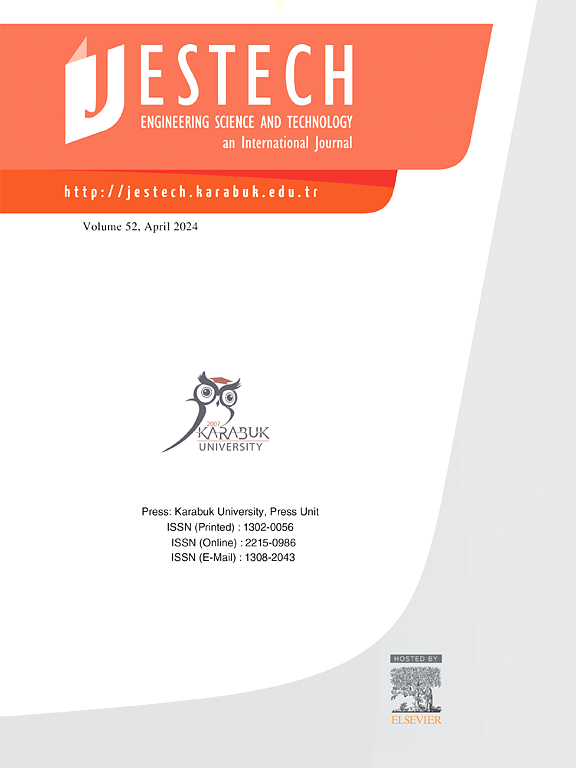FAST: A pioneering unlearning framework integrating fine-tuning, adverse training, and student–teacher methods
IF 5.1
2区 工程技术
Q1 ENGINEERING, MULTIDISCIPLINARY
Engineering Science and Technology-An International Journal-Jestech
Pub Date : 2025-02-17
DOI:10.1016/j.jestch.2025.101996
引用次数: 0
Abstract
In the evolving field of machine unlearning, the imperative to protect data privacy while maintaining essential information has become increasingly critical. This paper introduces a pioneering unlearning framework named FAST (Fine-tuning, Adverse Training, and Student–Teacher Methods). FAST is designed to selectively erase privacy-sensitive data while robustly safeguarding valuable information. It employs an innovative integration of the student–teacher architecture, utilizing targeted data and a sophisticated distribution structure refined by the Kullback–Leibler (KL) divergence within the loss function. Enhanced by fine-tuning and adverse training techniques, this integration amplifies beneficial knowledge from competent teachers and reduces ineffective knowledge from less capable ones, thereby enabling more effective and efficient unlearning processes. Furthermore, a new evaluation method called the Unlearning Effectiveness Score (UES) has been proposed for our unlearning model, aimed at providing a comprehensive metric to assess the effectiveness of the unlearning process. This approach rigorously evaluates the model using two sophisticated methods: the Zero Retrain Forgetting (ZRF) metric and Membership Inference Attacks (MIA). The UES is designed to not only measure the effectiveness of forgetting but also to ensure that the model is not easily susceptible to these attacks. These methods facilitate comprehensive comparisons with previous techniques such as bad teaching, Amnesiac, SCRUB, and straightforward fine-tuning. Our thorough experimental analysis, conducted across a variety of deep networks including MobileNet, ResNet, and VGG on the CIFAR and MUFAC datasets, confirms that FAST substantially surpasses existing approaches in both effectively forgetting targeted data and retaining necessary information, as demonstrated by its superior performance on UES metrics.
FAST:一个开创性的遗忘框架,整合了微调、逆向培训和学生-教师方法
在不断发展的机器学习领域,在维护基本信息的同时保护数据隐私的必要性变得越来越重要。本文介绍了一种名为FAST(微调,不利训练和学生-教师方法)的开创性遗忘框架。FAST旨在选择性地删除隐私敏感数据,同时稳健地保护有价值的信息。它采用了创新的学生-教师架构集成,利用目标数据和由损失函数内的Kullback-Leibler (KL)散度改进的复杂分布结构。通过微调和不利的培训技术,这种整合放大了称职教师的有益知识,减少了能力较差教师的无效知识,从而实现了更有效和高效的遗忘过程。此外,我们还提出了一种新的评估方法,称为遗忘效果评分(UES),旨在提供一个综合的指标来评估遗忘过程的有效性。该方法使用两种复杂的方法严格评估模型:零再训练遗忘(ZRF)度量和成员推理攻击(MIA)。设计UES不仅是为了测量遗忘的有效性,也是为了确保模型不容易受到这些攻击的影响。这些方法有助于与以前的技术进行全面的比较,比如糟糕的教学、失忆、擦洗和直接的微调。我们在CIFAR和MUFAC数据集上对多种深度网络(包括MobileNet、ResNet和VGG)进行了彻底的实验分析,证实FAST在有效遗忘目标数据和保留必要信息方面大大超过了现有方法,正如其在UES指标上的卓越表现所证明的那样。
本文章由计算机程序翻译,如有差异,请以英文原文为准。
求助全文
约1分钟内获得全文
求助全文
来源期刊

Engineering Science and Technology-An International Journal-Jestech
Materials Science-Electronic, Optical and Magnetic Materials
CiteScore
11.20
自引率
3.50%
发文量
153
审稿时长
22 days
期刊介绍:
Engineering Science and Technology, an International Journal (JESTECH) (formerly Technology), a peer-reviewed quarterly engineering journal, publishes both theoretical and experimental high quality papers of permanent interest, not previously published in journals, in the field of engineering and applied science which aims to promote the theory and practice of technology and engineering. In addition to peer-reviewed original research papers, the Editorial Board welcomes original research reports, state-of-the-art reviews and communications in the broadly defined field of engineering science and technology.
The scope of JESTECH includes a wide spectrum of subjects including:
-Electrical/Electronics and Computer Engineering (Biomedical Engineering and Instrumentation; Coding, Cryptography, and Information Protection; Communications, Networks, Mobile Computing and Distributed Systems; Compilers and Operating Systems; Computer Architecture, Parallel Processing, and Dependability; Computer Vision and Robotics; Control Theory; Electromagnetic Waves, Microwave Techniques and Antennas; Embedded Systems; Integrated Circuits, VLSI Design, Testing, and CAD; Microelectromechanical Systems; Microelectronics, and Electronic Devices and Circuits; Power, Energy and Energy Conversion Systems; Signal, Image, and Speech Processing)
-Mechanical and Civil Engineering (Automotive Technologies; Biomechanics; Construction Materials; Design and Manufacturing; Dynamics and Control; Energy Generation, Utilization, Conversion, and Storage; Fluid Mechanics and Hydraulics; Heat and Mass Transfer; Micro-Nano Sciences; Renewable and Sustainable Energy Technologies; Robotics and Mechatronics; Solid Mechanics and Structure; Thermal Sciences)
-Metallurgical and Materials Engineering (Advanced Materials Science; Biomaterials; Ceramic and Inorgnanic Materials; Electronic-Magnetic Materials; Energy and Environment; Materials Characterizastion; Metallurgy; Polymers and Nanocomposites)
 求助内容:
求助内容: 应助结果提醒方式:
应助结果提醒方式:


